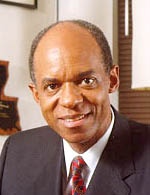 WASHINGTON D.C. — Rep. William Jefferson, D-La., was indicted today on federal charges of racketeering, soliciting bribes and money laundering in a long-running bribery investigation into business deals he tried to broker in Africa.
WASHINGTON D.C. — Rep. William Jefferson, D-La., was indicted today on federal charges of racketeering, soliciting bribes and money laundering in a long-running bribery investigation into business deals he tried to broker in Africa.
The indictment handed up in federal court in Alexandria, Va., is more than an inch thick and list 16 alleged violations of federal law that could keep Jefferson in prison for up to 200 years.
Almost two years ago, in August 2005, investigators raided Jefferson's home in Louisiana and found $90,000 in cash stuffed into a box in his freezer.
Jefferson, 63, whose Louisiana district includes New Orleans, has said little about the case publicly but has maintained his innocence. He was re-elected last year despite the looming investigation.
Jefferson, in Louisiana on Monday, could not immediately be reached for comment.
Two of Jefferson's associates have already struck plea bargains with prosecutors and have been sentenced.
Brett Pfeffer, a former congressional aide, admitted soliciting bribes on Jefferson's behalf and was sentenced to eight years in prison.
Another Jefferson associate, Louisville telecommunications executive Vernon Jackson, pleaded guilty to paying between $400,000 and $1 million in bribes to Jefferson in exchange for his assistance securing business deals in Nigeria and other African nations. Jackson was sentenced to more than seven years in prison.
Both Pfeffer and Jackson agreed to cooperate in the case against Jefferson in exchanges for their pleas.
The impact of the case has stretched across continents and even roiled presidential politics in Nigeria.
According to court records, Jefferson told associates that he needed cash to pay bribes to the country's vice president, Atiku Abubakar.
Abubakar denied the allegations, which figured prominently in that country's presidential elections in April. Abubakar ran for the presidency and finished third.
Court records indicate that Jefferson was videotape taking a $100,000 cash bribe from an FBI informant. Most of that money later turned up in a freezer in Jefferson's home.
In May 2006, the FBI raided Jefferson's congressional office, the first such raid on a sitting congressman's Capitol office. That move sparked a constitutional debate over whether the executive branch stepped over its boundary.
The legality of the raid is still being argued on appeal. House leaders objected to the search saying it was an unconstitutional intrusion on the lawmaking process. The FBI said the raid was necessary because Jefferson and his legal team had failed to respond to requests for documents.
Some but not all the documents seized in the raid have been turned over Justice Department prosecutors.
--The Associated Press
- Home
- News
- Opinion
- Entertainment
- Classified
- About Us
 MLK Breakfast
MLK Breakfast- Community
- Foundation
- Obituaries
- Donate
11-15-2024 11:57 am • PDX and SEA Weather














































































































































































































































































































